新视野读写教程2第三版课文UNIT
新视野大学英语(第三版)读写教程第二册课文翻译(全册)
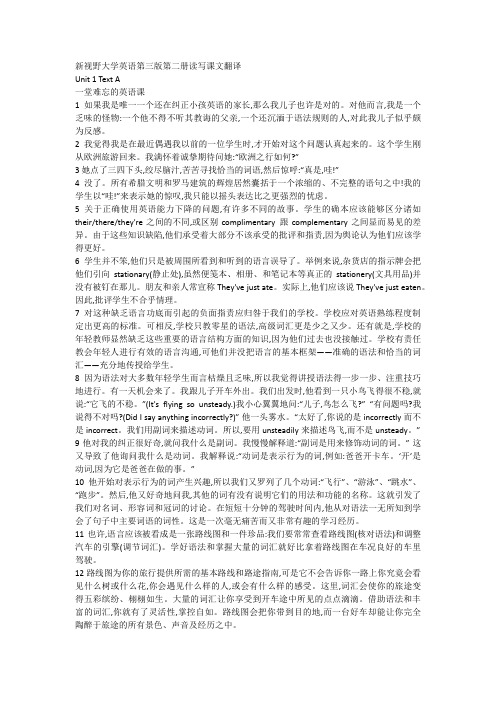
新视野大学英语第三版第二册读写课文翻译Unit 1 Text A一堂难忘的英语课1 如果我是唯一一个还在纠正小孩英语的家长,那么我儿子也许是对的。
对他而言,我是一个乏味的怪物:一个他不得不听其教诲的父亲,一个还沉湎于语法规则的人,对此我儿子似乎颇为反感。
2 我觉得我是在最近偶遇我以前的一位学生时,才开始对这个问题认真起来的。
这个学生刚从欧洲旅游回来。
我满怀着诚挚期待问她:“欧洲之行如何?”3 她点了三四下头,绞尽脑汁,苦苦寻找恰当的词语,然后惊呼:“真是,哇!”4 没了。
所有希腊文明和罗马建筑的辉煌居然囊括于一个浓缩的、不完整的语句之中!我的学生以“哇!”来表示她的惊叹,我只能以摇头表达比之更强烈的忧虑。
5 关于正确使用英语能力下降的问题,有许多不同的故事。
学生的确本应该能够区分诸如their/there/they're之间的不同,或区别complimentary 跟complementary之间显而易见的差异。
由于这些知识缺陷,他们承受着大部分不该承受的批评和指责,因为舆论认为他们应该学得更好。
6 学生并不笨,他们只是被周围所看到和听到的语言误导了。
举例来说,杂货店的指示牌会把他们引向stationary(静止处),虽然便笺本、相册、和笔记本等真正的stationery(文具用品)并没有被钉在那儿。
朋友和亲人常宣称They've just ate。
实际上,他们应该说They've just eaten。
因此,批评学生不合乎情理。
7 对这种缺乏语言功底而引起的负面指责应归咎于我们的学校。
学校应对英语熟练程度制定出更高的标准。
可相反,学校只教零星的语法,高级词汇更是少之又少。
还有就是,学校的年轻教师显然缺乏这些重要的语言结构方面的知识,因为他们过去也没接触过。
学校有责任教会年轻人进行有效的语言沟通,可他们并没把语言的基本框架——准确的语法和恰当的词汇——充分地传授给学生。
8 因为语法对大多数年轻学生而言枯燥且乏味,所以我觉得讲授语法得一步一步、注重技巧地进行。
新视野大学英语第三版读写教程第二册Unit3课文及翻译
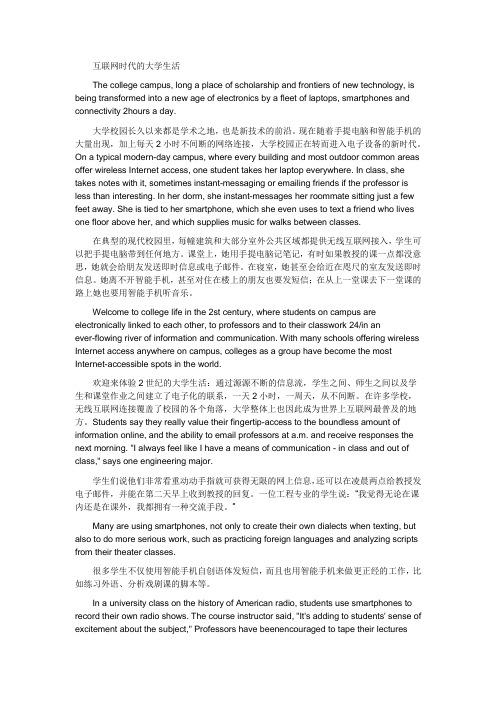
互联网时代的大学生活The college campus, long a place of scholarship and frontiers of new technology, is being transformed into a new age of electronics by a fleet of laptops, smartphones and connectivity 2hours a day.大学校园长久以来都是学术之地,也是新技术的前沿。
现在随着手提电脑和智能手机的大量出现,加上每天2小时不间断的网络连接,大学校园正在转而进入电子设备的新时代。
On a typical modern-day campus, where every building and most outdoor common areas offer wireless Internet access, one student takes her laptop everywhere. In class, she takes notes with it, sometimes instant-messaging or emailing friends if the professor is less than interesting. In her dorm, she instant-messages her roommate sitting just a few feet away. She is tied to her smartphone, which she even uses to text a friend who lives one floor above her, and which supplies music for walks between classes.在典型的现代校园里,每幢建筑和大部分室外公共区域都提供无线互联网接入,学生可以把手提电脑带到任何地方。
新视野大学英语第二版第三册读写教程unit1~unit10课文翻译和课后答案

第二版新视野大学英语读写教程第三册unit1~unit10课文翻译和课后答案Unit 11.我哥哥吉米出生时遇上难产,因为缺氧导致大脑受损。
两年后,我出生了。
从此以后,我的生活便围绕我哥哥转。
伴随我成长的,是“到外面去玩,把你哥哥也带上。
”不带上他,我是哪里也去不了的。
因此,我怂恿邻居的孩子到我家来,尽情地玩孩子们玩的游戏。
2.我母亲教吉米学习日常自理,比如刷牙或系皮带什么的。
我父亲宅心仁厚,他的耐心和理解使一家人心贴着心。
我则负责外面的事,找到那些欺负我哥哥的孩子们的父母,告他们的状,为我哥哥讨回公道。
3.父亲和吉米形影不离。
他们一道吃早饭,平时每天早上一道开车去海军航运中心,他们都在那里工作,吉米在那搬卸标有彩色代号的箱子。
晚饭后,他们一道交谈,玩游戏,直到深夜。
他们甚至用口哨吹相同的曲调。
4.所以,父亲1991年因心脏病去世时,吉米几乎崩溃了,尽管他尽量不表现出来。
他就是不能相信父亲去世这一事实。
通常,他是一个令人愉快的人,现在却一言不发,无论说多少话都不能透过他木然的脸部表情了解他的心事。
我雇了一个人和他住在一起,开车送他去上班。
然而,不管我怎么努力地维持原状,吉米还是认为他熟悉的世界已经消失了。
有一天,我问他:“你是不是想念爸爸?”他的嘴唇颤抖了几下,然后问我:“你怎么看,玛格丽特?他是我最好的朋友。
”接着,我俩都流下了眼泪。
5.六个月后,母亲因肺癌去世,剩下我一人来照顾吉米。
6.吉米不能马上适应去上班时没有父亲陪着,因此搬来纽约和我一起住了一段时间。
我走到哪里他就跟到哪里,他好像适应得很好。
但吉米依然想住在我父母的房子里,继续干他原来的工作。
我答应把他送回去。
此事最后做成了。
如今,他在那里生活了11年,在许多人的照料下,同时依靠自己生活得有声有色。
他已成了邻里间不可或缺的人物。
如果你有邮件要收,或有狗要遛,他就是你所要的人。
7.当然,母亲的话没错:可以有一个家,既能容纳他的缺陷又能装下我的雄心。
新视野第大学英语读写教程2_(第三版)_unit_6_课文原文 (1)

Door closer, are you?1 The next time you're deciding between rival options, one which is primary and the other which is secondary, ask yourself this question: What would Xiang Yu do?2 Xiang Yu was a Chinese imperial general in the third century BC who took his troops across the Zhang River on a raid into enemyterritory. To his troops' astonishment, he ordered their cooking pots crushed and their sailing ships burned.3 He explained that he was imposing on them a necessity for attaining victory over their opponents. What he said was surelymotivating, but it wasn't really appreciated by many of his loyal soldiers as they watched their vessels go up in flames. But the genius of General Xiang Yu's conviction would be validated both on the battlefield and in modern social science research. General Xiang Yu was a rare exception to the norm, a veteran leader who was highly respected for his many conquests and who achieved the summit of success.4 He is featured in Dan Ariely's enlightening new publication, Predictably Irrational, a fascinating investigation of seemingly irrational human behavior, such as the tendency for keeping multiple options open. Most people can't marshal the will for painful choices, not even students at the Massachusetts Institute of Technology (MIT), where Dr. Ariely teaches behavioral economics. In an experiment that investigated decision-making, hundreds of students couldn't bear to let their options vanish, even though it was clear they wouldprofit from doing so.5 The experiment revolved around a game that eliminated the excuses we usually have for refusing to let go. In the real world, we can always say, "It's good to preserve our options." Want a good example? A teenager is exhausted from soccer, ballet, piano, and Chinese lessons, but her parents won't stop any one of them because they might come in handy some day!6 In the experiment sessions, students played a computer game that provided cash behind three doors appearing on the screen. The rule was the more money you earned, the better player you were, given a total of 100 clicks. Every time the students opened a door by clicking on it, they would use up one click but wouldn't get any money. However, each subsequent click on that door would earn afluctuating sum of money, with one door always revealing more money than theothers. The important part of the rule was each door switch, though having no cash value, would also use up one of the 100 clicks. Therefore, the winning strategy was to quickly check all the doors and keep clicking on the one with the seemingly highest rewards.7 While playing the game, students noticed a modified visual element: Any door left un-clicked for a short while would shrink in size and vanish. Since they already understood the game, they should have ignored the vanishing doors. Nevertheless, they hurried to click on the lesser doors before they vanished, trying to keep them open. As a result, they wasted so many clicks rushing back to the vanishing doors that they lost money in the end. Why were the students so attached to the lesser doors? They would probably protestthat they were clinging to the doors to keep future options open, but, according to Dr. Ariely, that isn't the true factor.8 Instead of the excuse to maintain future options open, underneath it all the students' desire was to avoid the immediate, thoughtemporary, pain of watching options close. "Closing a door on an option is experienced as a loss, and people are willing to pay a big price to avoid the emotion of loss," Dr. Ariely says. In the experiment, the price was easily measured in lost cash. In life, the corresponding costs are often less obvious such as wasted time or missed opportunities.9 "Sometimes these doors are closing too slowly for us to see them vanishing," Dr. Ariely writes. "We may work more hours at our jobs without realizing that the childhood of our sons and daughters is slipping away."10 So, what can be done to restore balance in our lives? One answer, Dr. Ariely says, is to implement more prohibitions on overbooking. We can work to reduce options on our own, delegating tasks to others and even giving away ideas for others to pursue.He points to marriage as an example, "In marriage, we create a situation where we promise ourselves not to keep options open. We close doors and announce to others we've closed doors."11 Since conducting the door experiment, Dr. Ariely says he has made a conscious effort to lessen his load. He urges the rest of us to resign from committees, prune holiday card lists, rethink hobbies and remember the lessons of door closers like Xiang Yu.12 In other words, Dr. Ariely is encouraging us to discard those things that seem to have outward merit in favor of those things that actually enrich ourlives. We are naturally prejudiced to believe that more is better, but Dr. Ariely's research provides a dose of reality that strongly suggests otherwise.13 What price do we pay for trying to have more and more in life? What pleasure and satisfaction can be derived from focusing our energy and attention in a more concentrated fashion? Surely, we will have our respective answers.14 Consider these important questions: Will we have more by always increasing options or will we have more with fewer, carefully chosen options? What doors should we close in order to allow the right windows of opportunity and happiness to open?。
新视野大学英语读写教程2-(第三版)-unit-2-课文原文及翻译

Text A课文 AThe humani ties: Out of date?人文学科:过时了吗?When the goinggets tough, the toughtakeac count ing. When the job market worsen s, manyst udent s calcul ate they can't majorin Englis h orhist ory. They have to studysometh ing that boosts their prospe cts of landin g a job.当形势变得困难时,强者会去选学会计。
当就业市场恶化时,许多学生估算着他们不能再主修英语或历史。
他们得学一些能改善他们就业前景的东西。
The data show that as studen ts have increa singl y should eredthe ever-rising c ost of tuitio n,they have defect ed from the studyof the humani tiesand toward applie d scienc e and "hard"skills that they bet will lead to employ ment. In oth erwords, a colleg e educat ion is more andmor e seen as a meansfor econom ic better mentrather than a meansfor humanbetter ment.This is a trendthat i s likely to persis t and even accele rate.数据显示,随着学生肩负的学费不断增加,他们已从学习人文学科转向他们相信有益于将来就业的应用科学和“硬”技能。
新视野大学英语(第三版)读写教程2--unit5-Spendorsave—Thestudentx27sdilemma课文原文
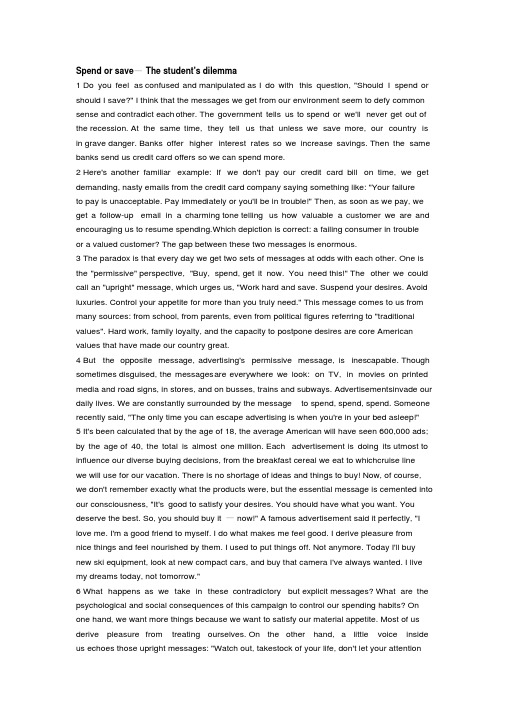
Spend or save — The student's dilemma1 Do you feel as confused and manipulated as I do with this question, "Should I spend or should I save?" I think that the messages we get from our environment seem to defy common sense and contradict each other. The government tells us to spend or we'll never get out of the recession. At the same time, they tell us that unless we save more, our country is in grave danger. Banks offer higher interest rates so we increase savings. Then the same banks send us credit card offers so we can spend more.2 Here's another familiar example: If we don't pay our credit card bill on time, we get demanding, nasty emails from the credit card company saying something like: "Your failureto pay is unacceptable. Pay immediately or you'll be in trouble!" Then, as soon as we pay, we get a follow-up email in a charming tone telling us how valuable a customer we are and encouraging us to resume spending.Which depiction is correct: a failing consumer in troubleor a valued customer? The gap between these two messages is enormous.3 The paradox is that every day we get two sets of messages at odds with each other. One is the "permissive" perspective, "Buy, spend, get it now. You need this!" The other we could call an "upright" message, which urges us, "Work hard and save. Suspend your desires. Avoid luxuries. Control your appetite for more than you truly need." This message comes to us from many sources: from school, from parents, even from political figures referring to "traditional values". Hard work, family loyalty, and the capacity to postpone desires are core American values that have made our country great.4 But the opposite message, advertising's permissive message, is inescapable. Though sometimes disguised, the messages a re everywhere we look: on TV, in movies on printed media and road signs, in stores, and on busses, trains and subways. Advertisementsinvade our daily lives. We are constantly surrounded by the message to spend, spend, spend. Someone recently said, "The only time you can escape advertising is when you're in your bed asleep!"5 It's been calculated that by the age of 18, the average American will have seen 600,000 ads; by the age of 40, the total is almost one million. Each advertisement is doing its utmost to influence our diverse buying decisions, from the breakfast cereal we eat to whichcruise linewe will use for our vacation. There is no shortage of ideas and things to buy! Now, of course, we don't remember exactly what the products were, but the essential message is cemented into our consciousness, "It's good to satisfy your desires. You should have what you want. You deserve the best. So, you should buy it — now!" A famous advertisement said it perfectly, "I love me. I'm a good friend to myself. I do what makes me feel good. I derive pleasure fromnice things and feel nourished by them. I used to put things off. Not anymore. Today I'll buy new ski equipment, look at new compact cars, and buy that camera I've always wanted. I live my dreams today, not tomorrow."6 What happens as we take in these contradictory but explicit messages? What are the psychological and social consequences of this campaign to control our spending habits? On one hand, we want more things because we want to satisfy our material appetite. Most of us derive pleasure from treating ourselves. On the other hand, a little voice inside us echoes those upright messages: "Watch out, takestock of your life, don't let your attentionget scattered. Postpone your desires. Don't fall into debt. Wait! Retain control over your own life. It will make you stronger."7 Anyway, many of the skills you need as a successful student can be applied to your finances. Consider your financial well-being as a key ingredient of your university educationas money worries are extremely stressful and distracting. They can make you feel terrible and hinder your ability to focus on your prime objective: successfully completing your education.8 How can you be a smart and educated consumer? Many schools, community organizations, and even some banks offer financial literacy classes. Consider consulting with your school's financial aid office or seek input from your parents or other respected adults in setting up a budget. An additional option is finding a partner to help you stay on track and find pleasure in the administration of your own financial affairs. Most importantly, if you find yourself getting into financial trouble, don't let your ego get in your way; urgently get help with tackling your problem before it spins out of control and lands you in legal troubles.9 All this will help you become an educated consumer and saver. As you learn to balance spending and saving, you will become the captain of your own ship, steering your life in a successful and productive direction through the choppy waters.。
新视野大学英语2读写教程Unit 3 Text A 课文文本及翻译_20200412151826

新视野大学英语2读写教程(第三版)Unit3课文文本及翻译Section A Text AJourney through the odyssey years奥德赛岁月之旅1Most of us know about the phases of life which we label to paralle l different age groups and life stages:Childhood,adolescence,adulthood,and old age.We think of infancy before childhood and middle age before old age,with each unique phase bringing its own peculiar set of challenges.These challenges can be overcome by acquainting ourselves with them,such as the child’s need to learn,the adult’s need to find the right career and build a family,and the senior’s need for support and good health care.2Interestingly,ideas about the stages of life are changing.3In previous times,people didn’t have a solid idea of childhood as being separate from adulthood.A hundred years ago,no one thought of adolescence.Until recently it was understood as a norm that their induction to adulthood was completed as soon as they graduated form college.They would now find a sensible job which would lead to a career.Then during this career they would start a family,ideally before they turned30.4Today we have an equivalent need to recognize a new phase of life that comes after high school graduation,continues through college,and then leads to starting a family and having a career,the so-called odyssey years.Recent trends show radical changes as young people are following a different agenda.They take breaks from school,live with friends and often return to living their parents.Similarly,they fall in and out of love,quit one job and try another or oven shift to a new career.So,we need to recognize this new stage,the odyssey years,which many now consider to be an unavoidable stage in reaching adulthood.5People who were born prior to the60s or70s in the last century tended to frame their concept of adulthood based upon achieving certain accomplishments:moving away from home,becoming financially independent,finding the right spouse and starting a family.But that emphasis on stability did not remain static.Today,young people are unlikely to do the same.During the odyssey years,a high proportion of young people are delaying marriage,child bearing,and even employment.6The odyssey years can saddle young people with enormous pressure to move forward quickly.As the sole heir and focus of their parents’expectations,hopes and dreams,some react with rebellious and prideful attitudes and behavior toward their parents.They often resent the pressure they’re feeling and keep distance from theirparents or even run away from home.Their confusion comes from the difficulties to make parents understand them and fluid journey of discovery they need in this phase of their lives.To get away from this confusion and upset,many young people resort to computer games,iPods,iPhones,or iPads to help distract them from their pain and stress.7Likewise,their parents are feeling more anxious.They may make allowances for a transition phase from student life to adult life,but they get upset when they see the transition of their grown children’s lives moving away from their expectations and stretching give years to seven years,and beyond.The parents don’t even detect a clear sense of direction in their children’s lives.They look at them and see the things that are being delayed.8It’s hard to predict what’s next.New guidelines haven’t been established yet,and everything seems to give way to a less permanent version of itself.There’s been a shift in the status and balance of power between the genders,too.More women are getting degrees than men.Male wages have remain stable over the past decades, while female wages have boomed.9Apart from anything else,this has had an implici t effect on cated women can get many of the things they want,such as security,accomplishment,and identity without marriage.However,both genders are having a harder time finding suitable mates to build their lives with.Considering all of this,it’s beneficial to know that even though graduates are delaying many things after college,surveys show they still hold highly traditional aspirations.For example,this contemporary generation rates parenthood even more likely than previous generations did!10This new phase will likely grow more pronounced in the coming years.Nations around the world have witnessed similar trends toward delaying marriage and spending more years than even shifting between higher education and settling down with a career and family.11Nevertheless,graduates shouldn’t be deceived into thinking they can back off simply because things have become more difficult.A large number of people chasing relatively fewer opportunities can create strong competitive pressure.So, from the outse t,keep your resume professional and up-to-date.12To reinforce this essential message,success moving through the odyssey years will come to those who don’t expect to achieve their goals right away but know that they must have the strength,capacity and confidence to endure over the long term.If you’re a little late with your goals,don’t feel like a failure!Stay strong,be positive, and keep focused!Someday you will look back and wonder at the vast changes as you passed through the odyssey years.1.我们大多数人都知道,根据不同的年龄和生活阶段。
新视野第大学英语读写教程2 (第三版) unit 1 课文原文
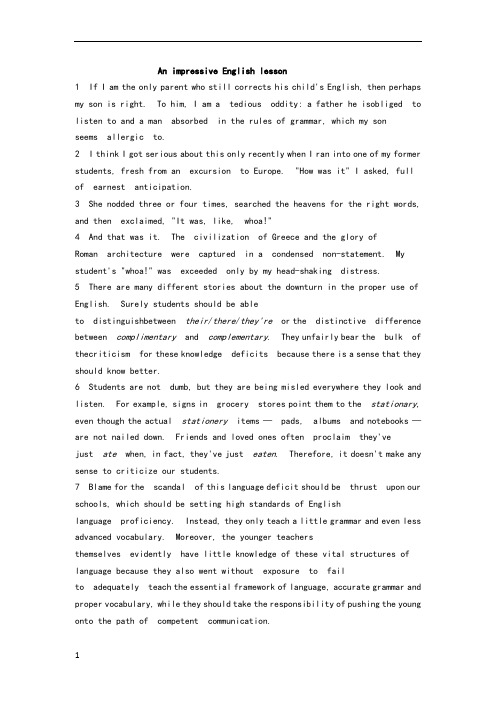
An impressive English lesson1 If I am the only parent who still corrects his child's English, then perhaps my son is right. To him, I am a tedious oddity: a father he isobliged to listen to and a man absorbed in the rules of grammar, which my sonseems allergic to.2 I think I got serious about this only recently when I ran into one of my former students, fresh from an excursion to Europe. "How was it" I asked, full of earnest anticipation.3 She nodded three or four times, searched the heavens for the right words, and then exclaimed, "It was, like, whoa!"4 And that was it. The civilization of Greece and the glory ofRoman architecture were captured in a condensed non-statement. My student's "whoa!" was exceeded only by my head-shaking distress.5 There are many different stories about the downturn in the proper use of English. Surely students should be ableto distinguishbetween their/there/they're or the distinctive difference between complimentary and complementary. They unfairly bear the bulk of thecriticism for these knowledge deficits because there is a sense that they should know better.6 Students are not dumb, but they are being misled everywhere they look and listen. For example, signs in grocery stores point them to the stationary, even though the actual stationery items —pads, albums and notebooks —are not nailed down. Friends and loved ones often proclaim they'vejust ate when, in fact, they've just eaten. Therefore, it doesn't make any sense to criticize our students.7 Blame for the scandal of this language deficit should be thrust upon our schools, which should be setting high standards of Englishlanguage proficiency. Instead, they only teach a little grammar and even less advanced vocabulary. Moreover, the younger teachersthemselves evidently have little knowledge of these vital structures of language because they also went without exposure to failto adequately teach the essential framework of language, accurate grammar and proper vocabulary, while they should take the responsibility of pushing the young onto the path of competent communication.8 Since grammar is boring to most of the young students, I think that it must be handled delicately, step by step. The chance came when one day I was driving with my son. As we set out on our trip, he noticed a bird in jerky flight and said, "It's flying so unsteady." I carefully asked, "My son, how is the bird flying" "What's wrong Did I say anything incorrectly" He gotlost. "Great! You said incorrectly instead of incorrect. We use adverbs to describe verbs. Therefore, it's flying so unsteadily but not so unsteady."9 Curious about my correction, he asked me what an adverb was. Slowly, I said, "It's a word that tells you something about a verb." It led to his asking me what a verb was. I explained, "Verbs are action words; for example, Dad drives the truck. Drive is the verb because it's the thing Dad is doing."10 He became attracted to the idea of action words, so we listed a few more: fly, swim, dive, run. Then, out of his own curiosity, he asked me if other words had names for their use and functions. This led to a discussion of nouns, adjectives, and articles. Within thespan of a 10-minute drive, he had learned from scratch to the major parts of speech in a sentence. It was painless learning and great fun!11 Perhaps, language should be looked upon as a road map and a valuable possession: often study the road map (check grammar) and tune up the car engine (adjust vocabulary). Learning grammar and a good vocabulary is just like driving with a road map in a well-conditioned car.12 The road map provides the framework and guidance you need for your trip, but it won't tell you exactly what trees or flowers you will see, what kind of people you will encounter, or what types of feelings you will be experiencing on your journey. Here, the vocabulary makes the journey's true colors come alive! A good vocabulary enables you to enjoy whatever you see as you drive along. Equipped with grammar and a good vocabulary, you have flexibility and excellent control. While the road map guides your journey to yourdestination, an excellent vehicle helps you to fully enjoy all of the sights, sounds and experiences along the way.13 Effective, precise, and beneficial communication depends upon grammar and a good vocabulary, the two essential assets for students, but they are not being taught in schools.14 Just this morning, my son and I were eating breakfast when I attempted to add milk to my tea. "Dad," he said, "If I were you, I wouldn't do that.It's sour."15 "Oh my!" I said, swelling with pride toward my son, "That's a grammatically perfect sentence. You used were instead of was."16 "I know, I know," he said with a long agreeable sigh. "It'sthe subjunctive mood."17 I was, like, whoa!。
新视野大学英语读写教程(第三版)第二册课文原文及翻译
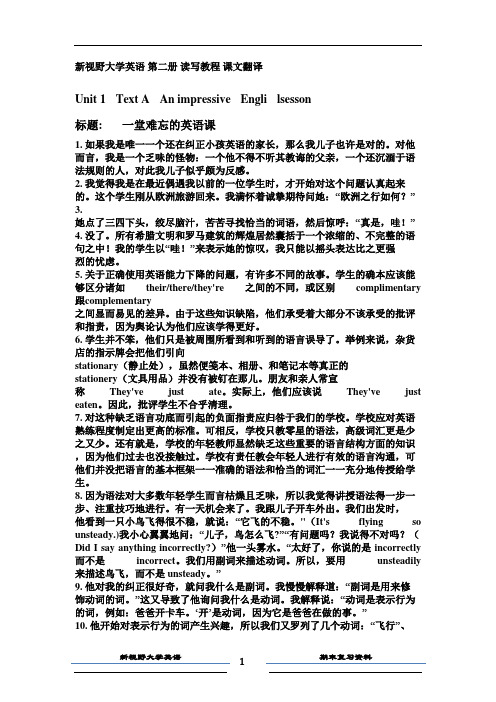
新视野大学英语第二册读写教程课文翻译Unit 1 Text A An impressive Engli lsesson标题: 一堂难忘的英语课1. 如果我是唯一一个还在纠正小孩英语的家长,那么我儿子也许是对的。
对他而言,我是一个乏味的怪物:一个他不得不听其教诲的父亲,一个还沉湎于语法规则的人,对此我儿子似乎颇为反感。
2. 我觉得我是在最近偶遇我以前的一位学生时,才开始对这个问题认真起来的。
这个学生刚从欧洲旅游回来。
我满怀着诚挚期待问她:“欧洲之行如何?”3.她点了三四下头,绞尽脑汁,苦苦寻找恰当的词语,然后惊呼:“真是,哇!”4. 没了。
所有希腊文明和罗马建筑的辉煌居然囊括于一个浓缩的、不完整的语句之中!我的学生以“哇!”来表示她的惊叹,我只能以摇头表达比之更强烈的忧虑。
5. 关于正确使用英语能力下降的问题,有许多不同的故事。
学生的确本应该能够区分诸如their/there/they're 之间的不同,或区别complimentary 跟complementary之间显而易见的差异。
由于这些知识缺陷,他们承受着大部分不该承受的批评和指责,因为舆论认为他们应该学得更好。
6. 学生并不笨,他们只是被周围所看到和听到的语言误导了。
举例来说,杂货店的指示牌会把他们引向stationary(静止处),虽然便笺本、相册、和笔记本等真正的stationery(文具用品)并没有被钉在那儿。
朋友和亲人常宣称They've just ate。
实际上,他们应该说They've just eaten。
因此,批评学生不合乎清理。
7. 对这种缺乏语言功底而引起的负面指责应归咎于我们的学校。
学校应对英语熟练程度制定出更高的标准。
可相反,学校只教零星的语法,高级词汇更是少之又少。
还有就是,学校的年轻教师显然缺乏这些重要的语言结构方面的知识,因为他们过去也没接触过。
学校有责任教会年轻人进行有效的语言沟通,可他们并没把语言的基本框架一一准确的语法和恰当的词汇一一充分地传授给学生。
新视野大学英语读写教程【第三版】第二册课文原文与翻译
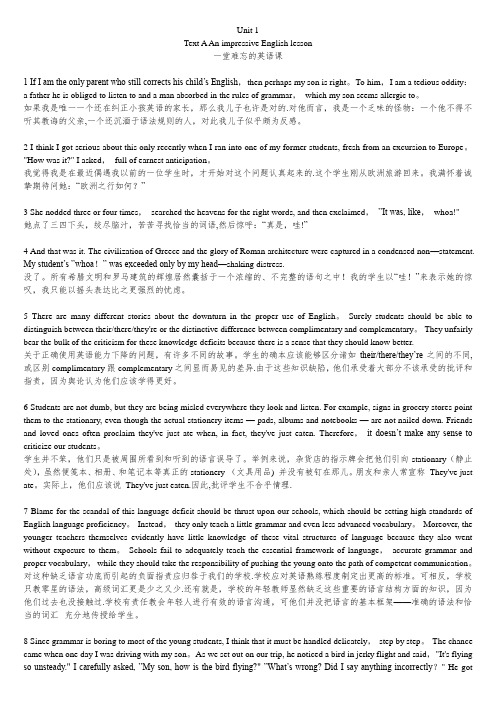
Unit 1Text A An impressive English lesson一堂难忘的英语课1 If I am the only parent who still corrects his child’s English,then perhaps my son is right。
To him,I am a tedious oddity:a father he is obliged to listen to and a man absorbed in the rules of grammar,which my son seems allergic to。
如果我是唯一一个还在纠正小孩英语的家长,那么我儿子也许是对的.对他而言,我是一个乏味的怪物:一个他不得不听其教诲的父亲,一个还沉湎于语法规则的人,对此我儿子似乎颇为反感。
2 I think I got serious about this only recently when I ran into one of my former students, fresh from an excursion to Europe。
"How was it?" I asked,full of earnest anticipation。
我觉得我是在最近偶遇我以前的一位学生时,才开始对这个问题认真起来的.这个学生刚从欧洲旅游回来。
我满怀着诚挚期待问她:“欧洲之行如何?”3 She nodded three or four times,searched the heavens for the right words, and then exclaimed,”It was, like,whoa!"她点了三四下头,绞尽脑汁,苦苦寻找恰当的词语,然后惊呼:“真是,哇!”4 And that was it. The civilization of Greece and the glory of Roman architecture were captured in a condensed non—statement. My student’s ”whoa!” was exceeded only by my head—shaking distress.没了。
新视野大学英语读写教程2-(第三版)-unit-2-课文原文及翻译
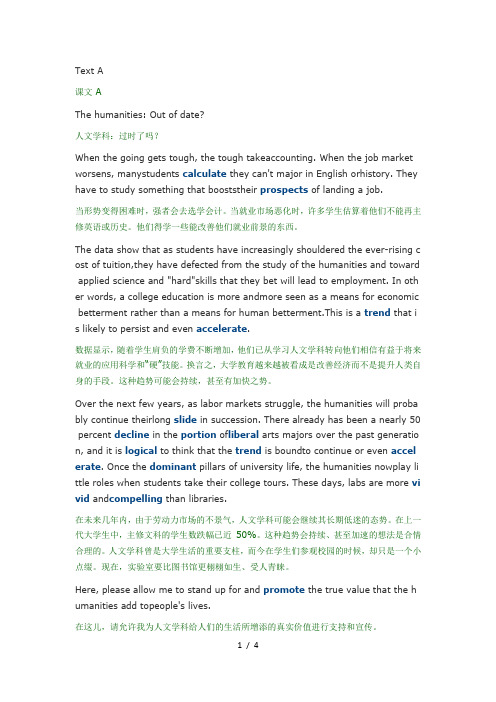
Text A课文 AThe humanities: Out of date?人文学科:过时了吗?When the going gets tough, the tough takeaccounting. When the job market worsens, manystudents calculate they can't major in English orhistory. They have to study something that booststheir prospects of landing a job.当形势变得困难时,强者会去选学会计。
当就业市场恶化时,许多学生估算着他们不能再主修英语或历史。
他们得学一些能改善他们就业前景的东西。
The data show that as students have increasingly shouldered the ever-rising c ost of tuition,they have defected from the study of the humanities and toward applied science and "hard"skills that they bet will lead to employment. In oth er words, a college education is more andmore seen as a means for economic betterment rather than a means for human betterment.This is a trend that i s likely to persist and even accelerate.数据显示,随着学生肩负的学费不断增加,他们已从学习人文学科转向他们相信有益于将来就业的应用科学和“硬”技能。
新视野大学英语第三版读写教程第二册UNIT1课文及翻译(A+B篇)

TEXT AAn impressive English lesson一堂难忘的英语课1 If I am the only parent who still corrects his child's English, then perhaps my son is right. To him,I am a tedious oddity: a father he is obliged to listen to and a man absorbed in the rules of grammar, which my son seems allergic to.如果我是唯一一个还在纠正小孩英语的家长,那么我儿子也许是对的。
对他而言,我是一个乏味的怪物:一个他不得不听其教诲的父亲,一个还沉湎于语法规则的人,对此我儿子似乎颇为反感。
2 I think I got serious about this only recently when I ran into one of my former students, fresh from an excursion to Europe. "How was it?" I asked, full of earnest anticipation.我觉得我是在最近偶遇我以前的一位学生时,才开始对这个问题认真起来的。
这个学生刚从欧洲旅游回来。
我满怀着诚挚期待问她:“欧洲之行如何?”3 She nodded three or four times, searched the heavens for the right words, and then exclaimed, "It was, like, whoa!"她点了三四下头,绞尽脑汁,苦苦寻找恰当的词语,然后惊呼:“真是,哇!”4 And that was it. The civilization of Greece and the glory of Roman architecture were captured ina condensed non-statement. My student's "whoa!" was exceeded only by my head-shaking distress.没了。
新视野大学英语第三版读写教程第二册Unit3课文及翻译.docx

U3 ACollege life in the Internet age互联网时代的大学生活The college campus, long a place of scholarship and frontiers of new technology, is being transformed into a new age of electronics by a fleet of laptops, smartphones and connectivity 2hours a day・大学校园长久以来都是学术之地,也是新技术的前沿。
现在随着手提电脑和智能手机的大量出现,加上每天2小时不间断的网络连接,大学校园正在转而进入电了设备的新时代。
On a typical modern-day campus, where every building and most outdoor common areas offer wireless Internet access, one student takes her laptop everywhere・ In class, she takes notes withit, sometimes instant-messaging or emailing friends if the professor is less than interesting. Inher dorm, she instant-messages her roommate sitting just a few feet away. She is tied to her smartphone, which she even uses to text a friend who lives one floor above her, and which supplies music for walks between classes・在典型的现代校园里,每幢建筑和大部分室外公共区域都提供无线互联网接入,学生可以把手提电脑带到任何地方。
新视野大学英语2读写教程Unit 3 Text A 课文文本及翻译_20200412151826

新视野大学英语2读写教程(第三版)Unit3课文文本及翻译Section A Text AJourney through the odyssey years奥德赛岁月之旅1Most of us know about the phases of life which we label to paralle l different age groups and life stages:Childhood,adolescence,adulthood,and old age.We think of infancy before childhood and middle age before old age,with each unique phase bringing its own peculiar set of challenges.These challenges can be overcome by acquainting ourselves with them,such as the child’s need to learn,the adult’s need to find the right career and build a family,and the senior’s need for support and good health care.2Interestingly,ideas about the stages of life are changing.3In previous times,people didn’t have a solid idea of childhood as being separate from adulthood.A hundred years ago,no one thought of adolescence.Until recently it was understood as a norm that their induction to adulthood was completed as soon as they graduated form college.They would now find a sensible job which would lead to a career.Then during this career they would start a family,ideally before they turned30.4Today we have an equivalent need to recognize a new phase of life that comes after high school graduation,continues through college,and then leads to starting a family and having a career,the so-called odyssey years.Recent trends show radical changes as young people are following a different agenda.They take breaks from school,live with friends and often return to living their parents.Similarly,they fall in and out of love,quit one job and try another or oven shift to a new career.So,we need to recognize this new stage,the odyssey years,which many now consider to be an unavoidable stage in reaching adulthood.5People who were born prior to the60s or70s in the last century tended to frame their concept of adulthood based upon achieving certain accomplishments:moving away from home,becoming financially independent,finding the right spouse and starting a family.But that emphasis on stability did not remain static.Today,young people are unlikely to do the same.During the odyssey years,a high proportion of young people are delaying marriage,child bearing,and even employment.6The odyssey years can saddle young people with enormous pressure to move forward quickly.As the sole heir and focus of their parents’expectations,hopes and dreams,some react with rebellious and prideful attitudes and behavior toward their parents.They often resent the pressure they’re feeling and keep distance from theirparents or even run away from home.Their confusion comes from the difficulties to make parents understand them and fluid journey of discovery they need in this phase of their lives.To get away from this confusion and upset,many young people resort to computer games,iPods,iPhones,or iPads to help distract them from their pain and stress.7Likewise,their parents are feeling more anxious.They may make allowances for a transition phase from student life to adult life,but they get upset when they see the transition of their grown children’s lives moving away from their expectations and stretching give years to seven years,and beyond.The parents don’t even detect a clear sense of direction in their children’s lives.They look at them and see the things that are being delayed.8It’s hard to predict what’s next.New guidelines haven’t been established yet,and everything seems to give way to a less permanent version of itself.There’s been a shift in the status and balance of power between the genders,too.More women are getting degrees than men.Male wages have remain stable over the past decades, while female wages have boomed.9Apart from anything else,this has had an implici t effect on cated women can get many of the things they want,such as security,accomplishment,and identity without marriage.However,both genders are having a harder time finding suitable mates to build their lives with.Considering all of this,it’s beneficial to know that even though graduates are delaying many things after college,surveys show they still hold highly traditional aspirations.For example,this contemporary generation rates parenthood even more likely than previous generations did!10This new phase will likely grow more pronounced in the coming years.Nations around the world have witnessed similar trends toward delaying marriage and spending more years than even shifting between higher education and settling down with a career and family.11Nevertheless,graduates shouldn’t be deceived into thinking they can back off simply because things have become more difficult.A large number of people chasing relatively fewer opportunities can create strong competitive pressure.So, from the outse t,keep your resume professional and up-to-date.12To reinforce this essential message,success moving through the odyssey years will come to those who don’t expect to achieve their goals right away but know that they must have the strength,capacity and confidence to endure over the long term.If you’re a little late with your goals,don’t feel like a failure!Stay strong,be positive, and keep focused!Someday you will look back and wonder at the vast changes as you passed through the odyssey years.1.我们大多数人都知道,根据不同的年龄和生活阶段。
新视野第大学英语读写教程2(第三版)unit1课文原文

An impressive English lesson1?If I am the only parent who still corrects his child's English, then perhaps my son is right.?To him, I am a?tedious?oddity: a father he isobliged?to listen to and a man?absorbed?in the rules of grammar, which my son seems?allergic?to. 2?I think I got serious about this only recently when I ran into one of my former students, fresh from an?excursion?to Europe.?"How was it" I asked, fullof?earnest?anticipation.3?She nodded three or four times, searched the heavens for the right words, and then?exclaimed, "It was, like,?whoa!"4?And that was it.?The?civilization?of Greece and the glory ofRoman?architecture?were?captured?in a?condensed?non-statement.?My student's "whoa!" was?exceeded?only by my head-shaking?distress.5?There are many different stories about the downturn in the proper use of English.?Surely students should be ableto?distinguishbetween?their/there/they're?or the?distinctive?difference between?complimentary?and?complementary.?They unfairly bear the?bulk?of thecriticism?for these knowledge?deficits?because there is a sense that they should know better.6?Students are not?dumb, but they are being misled everywhere they look and listen.?For example, signs in?grocery?stores point them to the?stationary, even though the actual?stationery?items —?pads,?albums?and notebooks — are not nailed down.?Friends and loved ones often?proclaim?they've just?ate?when, in fact, they've just?eaten.?Therefore, it doesn't make any sense to criticize our students.7?Blame for the?scandal?of this language deficit should be?thrust?upon our schools, which should be setting high standards of Englishlanguage?proficiency.?Instead, they only teach a little grammar and even less advanced vocabulary.?Moreover, the younger teachers themselves?evidently?have little knowledge of these vital structures of language because they also went without?exposure?to fail to?adequately?teach the essential framework of language, accurate grammar and proper vocabulary, while they should take the responsibility of pushing the young onto the path of?competent?communication. 8?Since grammar is boring to most of the young students, I think that it must be handled delicately, step by step.?The chance came when one day I was driving with my son.?As we set out on our trip, he noticed a bird in?jerky?flight and said, "It's flying so unsteady."?I carefully asked, "My son, how is the bird flying"?"What's wrong Did I say anything incorrectly"?He got lost.?"Great! You said incorrectly?instead of?incorrect. We use adverbs to describe verbs. Therefore, it's flying so?unsteadily?but not so?unsteady."9?Curious about my correction, he asked me what an adverb was.?Slowly, I said, "It's a word that tells you something about a verb."?It led to his asking mewhat a verb was.?I explained, "Verbs are action words; for example, Dad drives the truck.?Drive?is the verb because it's the thing Dad is doing."10 He became attracted to the idea of action words, so we listed a few more:?fly, swim, dive, run.?Then, out of his own curiosity, he asked me if other words had names for their use and?functions.?This led to a discussion of nouns, adjectives, and articles.?Within thespan?of a 10-minute drive, he had learnedfrom?scratch?to the major parts of speech in a sentence.?It was painless learning and great fun!11?Perhaps, language should be looked upon as a road map and a valuable possession: often study the road map (check grammar) and?tune?up the car engine (adjust?vocabulary).?Learning grammar and a good vocabulary is just like driving with a road map in a well-conditioned car.12?The road map provides the framework and guidance you need for your trip, but it won't tell you exactly what trees or flowers you will see, what kind of people you will encounter, or what types of feelings you will be experiencing on your journey.?Here, the vocabulary makes the journey's true colors come alive!?A good vocabulary enables you to enjoy whatever you see as you drive along.?Equipped with grammar and a good vocabulary, you have flexibility and excellent control.?While the road map guides your journey to yourdestination, an excellent vehicle helps you to fully enjoy all of the sights, sounds and experiences along the way.13?Effective,?precise, and?beneficial?communication depends upon grammar and a good vocabulary, the two essential?assets?for students, but they are not being taught in schools.14?Just this morning, my son and I were eating breakfast when I attempted to add milk to my tea.?"Dad," he said, "If I were you, I wouldn't do that. It's?sour." 15?"Oh my!"?I said, swelling with pride toward my son, "That's a grammatically perfect sentence. You used?were?instead of?was."16?"I know, I know," he said with a long agreeable sigh. "It'sthe?subjunctive?mood."17?I was, like, whoa!。
新视野大学英语第三版读写教程第二册Unit2课文及翻译
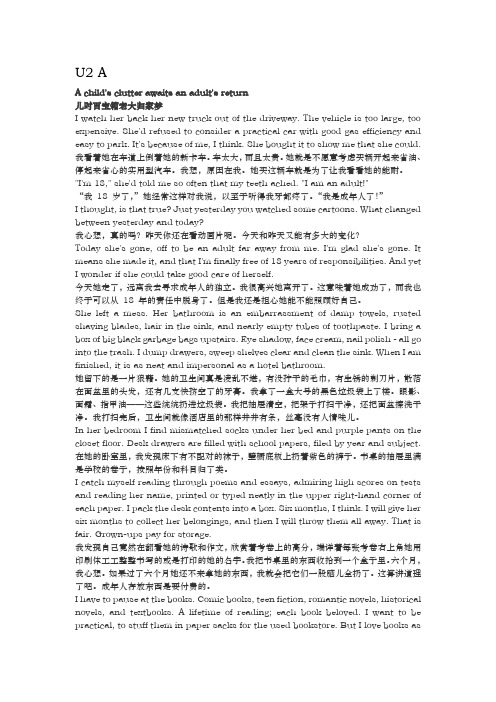
U2 AA child's clutter awaits an adult's return儿时百宝箱老大归家梦I watch her back her new truck out of the driveway. The vehicle is too large, too expensive. She'd refused to consider a practical car with good gas efficiency and easy to park. It's because of me, I think. She bought it to show me that she could. 我看着她在车道上倒着她的新卡车。
车太大,而且太贵。
她就是不愿意考虑买辆开起来省油、停起来省心的实用型汽车。
我想,原因在我。
她买这辆车就是为了让我看看她的能耐。
"I'm 18," she'd told me so often that my teeth ached. "I am an adult!"“我18 岁了,”她经常这样对我说,以至于听得我牙都疼了。
“我是成年人了!”I thought, is that true? Just yesterday you watched some cartoons. What changed between yesterday and today?我心想,真的吗?昨天你还在看动画片呢。
今天和昨天又能有多大的变化?Today she's gone, off to be an adult far away from me. I'm glad she's gone. It means she made it, and that I'm finally free of 18 years of responsibilities. And yet I wonder if she could take good care of herself.今天她走了,远离我去寻求成年人的独立。
新视野大学英语第二版第三册读写教程unit1~unit10课文翻译和课后答案整理
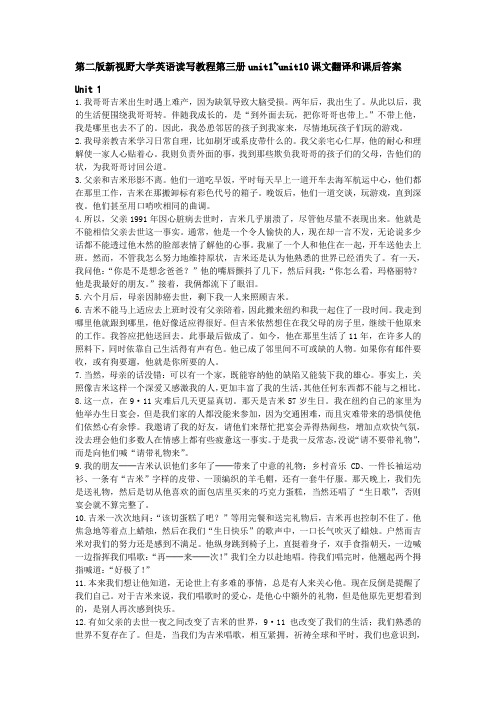
第二版新视野大学英语读写教程第三册unit1~unit10课文翻译和课后答案Unit 11.我哥哥吉米出生时遇上难产,因为缺氧导致大脑受损。
两年后,我出生了。
从此以后,我的生活便围绕我哥哥转。
伴随我成长的,是“到外面去玩,把你哥哥也带上。
”不带上他,我是哪里也去不了的。
因此,我怂恿邻居的孩子到我家来,尽情地玩孩子们玩的游戏。
2.我母亲教吉米学习日常自理,比如刷牙或系皮带什么的。
我父亲宅心仁厚,他的耐心和理解使一家人心贴着心。
我则负责外面的事,找到那些欺负我哥哥的孩子们的父母,告他们的状,为我哥哥讨回公道。
3.父亲和吉米形影不离。
他们一道吃早饭,平时每天早上一道开车去海军航运中心,他们都在那里工作,吉米在那搬卸标有彩色代号的箱子。
晚饭后,他们一道交谈,玩游戏,直到深夜。
他们甚至用口哨吹相同的曲调。
4.所以,父亲1991年因心脏病去世时,吉米几乎崩溃了,尽管他尽量不表现出来。
他就是不能相信父亲去世这一事实。
通常,他是一个令人愉快的人,现在却一言不发,无论说多少话都不能透过他木然的脸部表情了解他的心事。
我雇了一个人和他住在一起,开车送他去上班。
然而,不管我怎么努力地维持原状,吉米还是认为他熟悉的世界已经消失了。
有一天,我问他:“你是不是想念爸爸?”他的嘴唇颤抖了几下,然后问我:“你怎么看,玛格丽特?他是我最好的朋友。
”接着,我俩都流下了眼泪。
5.六个月后,母亲因肺癌去世,剩下我一人来照顾吉米。
6.吉米不能马上适应去上班时没有父亲陪着,因此搬来纽约和我一起住了一段时间。
我走到哪里他就跟到哪里,他好像适应得很好。
但吉米依然想住在我父母的房子里,继续干他原来的工作。
我答应把他送回去。
此事最后做成了。
如今,他在那里生活了11年,在许多人的照料下,同时依靠自己生活得有声有色。
他已成了邻里间不可或缺的人物。
如果你有邮件要收,或有狗要遛,他就是你所要的人。
7.当然,母亲的话没错:可以有一个家,既能容纳他的缺陷又能装下我的雄心。
新视野大学英语第三版读写教程第二册Unit 3 Door closer, are you?(课文+词汇)
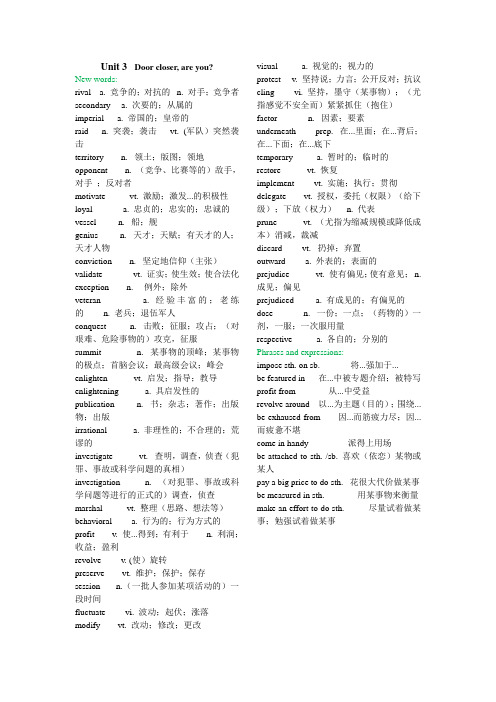
Unit 3 Door closer, are you?New words:rival a. 竞争的;对抗的 n. 对手;竞争者secondary a. 次要的;从属的imperial a. 帝国的;皇帝的raid n. 突袭;袭击 vt. (军队)突然袭击territory n. 领土;版图;领地opponent n. (竞争、比赛等的)敌手,对手;反对者motivate vt. 激励;激发...的积极性loyal a. 忠贞的;忠实的;忠诚的vessel n. 船;舰genius n. 天才;天赋;有天才的人;天才人物conviction n. 坚定地信仰(主张)validate vt. 证实;使生效;使合法化exception n. 例外;除外veteran a. 经验丰富的;老练的 n. 老兵;退伍军人conquest n. 击败;征服;攻占;(对艰难、危险事物的)攻克,征服summit n. 某事物的顶峰;某事物的极点;首脑会议;最高级会议;峰会enlighten vt. 启发;指导;教导enlightening a. 具启发性的publication n. 书;杂志;著作;出版物;出版irrational a. 非理性的;不合理的;荒谬的investigate vt. 查明,调查,侦查(犯罪、事故或科学问题的真相)investigation n. (对犯罪、事故或科学问题等进行的正式的)调查,侦查marshal vt. 整理(思路、想法等)behavioral a. 行为的;行为方式的profit v. 使...得到;有利于n. 利润;收益;盈利revolve v. (使)旋转preserve vt. 维护;保护;保存session n.(一批人参加某项活动的)一段时间fluctuate vi. 波动;起伏;涨落modify vt. 改动;修改;更改visual a. 视觉的;视力的protest v. 坚持说;力言;公开反对;抗议cling vi. 坚持,墨守(某事物);(尤指感觉不安全而)紧紧抓住(抱住)factor n. 因素;要素underneath prep. 在...里面;在...背后;在...下面;在...底下temporary a. 暂时的;临时的restore vt. 恢复implement vt. 实施;执行;贯彻delegate vt. 授权,委托(权限)(给下级);下放(权力)n. 代表prune vt. (尤指为缩减规模或降低成本)消减,裁减discard vt. 扔掉;弃置outward a. 外表的;表面的prejudice vt. 使有偏见;使有意见;n. 成见;偏见prejudiced a. 有成见的;有偏见的dose n. 一份;一点;(药物的)一剂,一服;一次服用量respective a. 各自的;分别的Phrases and expressions:impose sth. on sb. 将...强加于...be featured in 在...中被专题介绍;被特写profit from 从...中受益revolve around 以...为主题(目的);围绕... be exhaused from 因...而筋疲力尽;因...而疲惫不堪come in handy 派得上用场be attached to sth. /sb. 喜欢(依恋)某物或某人pay a big price to do sth. 花很大代价做某事be measured in sth. 用某事物来衡量make an effort to do sth. 尽量试着做某事;勉强试着做某事Door closer, are you?1 The next time you're deciding between rival options, one which is primary and the other which is secondary, ask yourself this question: What would Xiang Yu do?2 Xiang Yu was a Chinese imperial general in the third century BC who took his troops across the Zhang River on a raid into enemy territory. To his troops' astonishment, he ordered their cooking pots crushed and their sailing ships burned.3 He explained that he was imposing on them a necessity for attaining victory over their opponents. What he said was surely motivating, but it wasn't really appreciated by many of his loyal soldiers as they watched their vessels go up in flames. But the genius of General Xiang Yu's conviction would be validated both on the battlefield and in modern social science research. General Xiang Yu was a rare exception to the norm, a veteran leader who was highly respected for his many conquests and who achieved the summit of success.4 He is featured in Dan Ariely's enlightening new publication, Predictably Irrational,a fascinating investigation of seemingly irrational human behavior, such as the tendency for keeping multiple options open. Most people can't marshal the will for painful choices, not even students at the Massachusetts Institute of Technology (MIT), where Dr. Ariely teaches behavioral economics. In an experiment that investigated decision-making, hundreds of students couldn't bear to let their options vanish, even though it was clear they would profit from doing so.5 The experiment revolved around a game that eliminated the excuses we usually have for refusing to let go. In the real world, we can always say, "It's good to preserve our options." Want a good example? A teenager is exhausted from soccer, ballet, piano, and Chinese lessons, but her parents won't stop any one of them because they might come in handy some day!6 In the experiment sessions, students played a computer game that provided cash behind three doors appearing on the screen. The rule was the more money you earned, the better player you were, given a total of 100 clicks. Every time the students opened a door by clicking on it, they would use up one click but wouldn't get any money. However, each subsequent click on that door would earn a fluctuating sum of money, with one door always revealing more money than the others. The important part of the rule was each door switch, though having no cash value, would also use up one of the 100 clicks. Therefore, the winning strategy was to quickly check all the doors and keep clicking on the one with the seemingly highest rewards.7 While playing the game, students noticed a modified visual element: Any door left unclicked for a short while would shrink in size and vanish. Since they already understood the game, they should have ignored the vanishing doors. Nevertheless, they hurried to click on the lesser doors before they vanished, trying to keep them open. As a result, they wasted so many clicks rushing back to the vanishing doors that they lost money in the end. Why were the students so attached to the lesser doors? They would probably protest that they were clinging to the doors to keep future options open, but, according to Dr. Ariely, that isn't the true factor.8 Instead of the excuse to maintain future options open, underneath it all the students' desire was to avoid the immediate, though temporary, pain of watching options close."Closing a door on an option is experienced as a loss, and people are willing to pay a big price to avoid the emotion of loss," Dr. Ariely says. In the experiment, the price was easily measured in lost cash. In life, the corresponding costs are often less obvious such as wasted time or missed opportunities.9 "Sometimes these doors are closing too slowly for us to see them vanishing," Dr. Ariely writes. "We may work more hours at our jobs without realizing that the childhood of our sons and daughters is slipping away."10 So, what can be done to restore balance in our lives? One answer, Dr. Ariely says, is to implement more prohibitions on overbooking. We can work to reduce options on our own, delegating tasks to others and even giving away ideas for others to pursue. He points to marriage as an example, "In marriage, we create a situation where we promise ourselves not to keep options open. We close doors and announce to others we've closed doors."11 Since conducting the door experiment, Dr. Ariely says he has made a conscious effort to lessen his load. He urges the rest of us to resign from committees, prune holiday card lists, rethink hobbies and remember the lessons of door closers like Xiang Yu.12 In other words, Dr. Ariely is encouraging us to discard those things that seem to have outward merit in favor of those things that actually enrich our lives. We are naturally prejudiced to believe that more is better, but Dr. Ariely's research provides a dose of reality that strongly suggests otherwise.13 What price do we pay for trying to have more and more in life? What pleasure and satisfaction can be derived from focusing our energy and attention in a more concentrated fashion? Surely, we will have our respective answers.14 Consider these important questions: Will we have more by always increasing options or will we have more with fewer, carefully chosen options? What doors should we close in order to allow the right windows of opportunity and happiness to open?。
新视野大学英语第三版读写教程第二册UNIT4课文及翻译(College sweethearts)
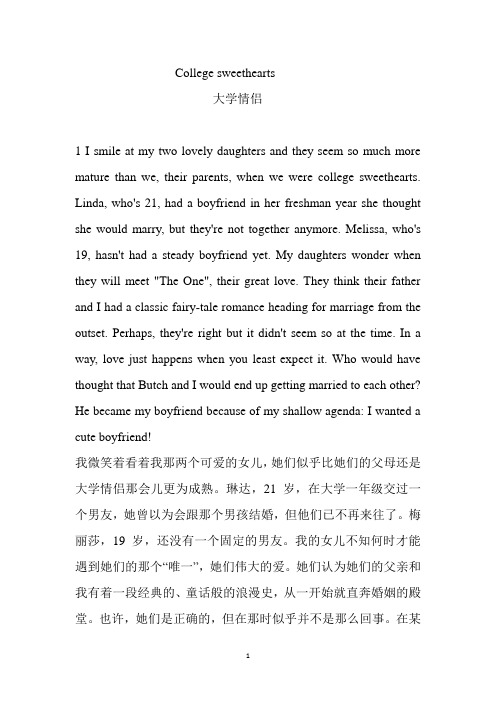
College sweethearts大学情侣1 I smile at my two lovely daughters and they seem so much more mature than we, their parents, when we were college sweethearts. Linda, who's 21, had a boyfriend in her freshman year she thought she would marry, but they're not together anymore. Melissa, who's 19, hasn't had a steady boyfriend yet. My daughters wonder when they will meet "The One", their great love. They think their father and I had a classic fairy-tale romance heading for marriage from the outset. Perhaps, they're right but it didn't seem so at the time. In a way, love just happens when you least expect it. Who would have thought that Butch and I would end up getting married to each other? He became my boyfriend because of my shallow agenda: I wanted a cute boyfriend!我微笑着看着我那两个可爱的女儿,她们似乎比她们的父母还是大学情侣那会儿更为成熟。
- 1、下载文档前请自行甄别文档内容的完整性,平台不提供额外的编辑、内容补充、找答案等附加服务。
- 2、"仅部分预览"的文档,不可在线预览部分如存在完整性等问题,可反馈申请退款(可完整预览的文档不适用该条件!)。
- 3、如文档侵犯您的权益,请联系客服反馈,我们会尽快为您处理(人工客服工作时间:9:00-18:30)。
TEXT AAn impressive English lesson一堂难忘的英语课1 If I am the only parent who still corrects his child's English, then perhaps my son is right. To him,I am a tedious oddity: a father he is obliged to listen to and a man absorbed in the rules of grammar, which my son seems allergic to.如果我是唯一一个还在纠正小孩英语的家长,那么我儿子也许是对的。
对他而言,我是一个乏味的怪物:一个他不得不听其教诲的父亲,一个还沉湎于语法规则的人,对此我儿子似乎颇为反感。
2 I think I got serious about this only recently when I ran into one of my former students, fresh from an excursion to Europe. "How was it?" I asked, full of earnest anticipation.我觉得我是在最近偶遇我以前的一位学生时,才开始对这个问题认真起来的。
这个学生刚从欧洲旅游回来。
我满怀着诚挚期待问她:“欧洲之行如何?”3 She nodded three or four times, searched the heavens for the right words, and then exclaimed, "It was, like, whoa!"她点了三四下头,绞尽脑汁,苦苦寻找恰当的词语,然后惊呼:“真是,哇!”4 And that was it. The civilization of Greece and the glory of Roman architecture were captured ina condensed non-statement. My student's "whoa!" was exceeded only by my head-shaking distress.没了。
所有希腊文明和罗马建筑的辉煌居然囊括于一个浓缩的、不完整的语句之中!我的学生以“哇!”来表示她的惊叹,我只能以摇头表达比之更强烈的忧虑。
5 There are many different stories about the downturn in the proper use of English. Surely students should be able to distinguish between their/there/they're or the distinctive difference between complimentary and complementary. They unfairly bear the bulk of the criticism for these knowledge deficits because there is a sense that they should know better.关于正确使用英语能力下降的问题,有许多不同的故事。
学生的确本应该能够区分诸如their/there/they’re之间的不同,或区别complimentary跟complementary之间显而易见的差异。
由于这些知识缺陷,他们承受着大部分不该承受的批评和指责,因为舆论认为他们应该学得更好。
6 Students are not dumb, but they are being misled everywhere they look and listen. For example, signs in grocery stores point them to the stationary, even though the actual stationery items —pads, albums and notebooks —are not nailed down. Friends and loved ones often proclaim they've just ate when, in fact, they've just eaten. Therefore, it doesn't make any sense to criticize our students.学生并不笨,他们只是被周围所看到和听到的语言误导了。
举例来说,杂货店的指示牌会把他们引向stationary(静止处),虽然便笺本、相册、和笔记本等真正的stationery (文具用品) 并没有被钉在那儿。
朋友和亲人常宣称They’ve just ate。
实际上,他们应该说They’ve just eaten。
因此,批评学生不合乎情理。
7 Blame for the scandal of this language deficit should be thrust upon our schools, which should be setting high standards of English language proficiency. Instead, they only teach a little grammar and even less advanced vocabulary. Moreover, the younger teachers themselves evidently have little knowledge of these vital structures of language because they also went without exposure to them. Schools fail to adequately teach the essential framework of language, accurate grammar and proper vocabulary, while they should take the responsibility of pushing the young onto the path of competent communication.对这种缺乏语言功底而引起的负面指责应归咎于我们的学校。
学校应对英语熟练程度制定出更高的标准。
可相反,学校只教零星的语法,高级词汇更是少之又少。
还有就是,学校的年轻教师显然缺乏这些重要的语言结构方面的知识,因为他们过去也没接触过。
学校有责任教会年轻人进行有效的语言沟通,可他们并没把语言的基本框架——准确的语法和恰当的词汇——充分地传授给学生。
8 Since grammar is boring to most of the young students, I think that it must be handled delicately, step by step. The chance came when one day I was driving with my son. As we set out on our trip, he noticed a bird in jerky flight and said, "It's flying so unsteady." I carefully asked, "My son, how is the bird flying?" "What's wrong? Did I say anything incorrectly?" He got lost. "Great! You said incorrectly instead of incorrect. We use adverbs to describe verbs. Therefore, it's flying so unsteadily but not so unsteady."因为语法对大多数年轻学生而言枯燥且乏味,所以我觉得讲授语法得一步一步、注重技巧地进行。
有一天机会来了。
我跟儿子开车外出。
我们出发时,他看到一只小鸟飞得很不稳,就说:“它飞的不稳。
”(It’s flying so unsteady.)我小心翼翼地问:“儿子,鸟怎么飞?”“有问题吗?我说得不对吗?(Did I say anything incorrectly?)”他一头雾水。
“太好了,你说的是incorrectly而不是incorrect。
我们用副词来描述动词。
所以,要用unsteadily来描述鸟飞,而不是unsteady。
”9 Curious about my correction, he asked me what an adverb was. Slowly, I said, "It's a word that tells you something about a verb." It led to his asking me what a verb was. I explained, "Verbs are action words; for example, Dad drives the truck. Drive is the verb because it's the thing Dad is doing."他对我的纠正很好奇,就问我什么是副词。
我慢慢解释道:“副词是用来修饰动词的词。
”这又导致了他询问我什么是动词。
我解释说:“动词是表示行为的词,例如:爸爸开卡车。
‘开’是动词,因为它是爸爸在做的事。
”10 He became attracted to the idea of action words, so we listed a few more: fly, swim, dive, run. Then, out of his own curiosity, he asked me if other words had names for their use and functions. This led to a discussion of nouns, adjectives, and articles. Within the span of a 10-minute drive, he had learned from scratch to the major parts of speech in a sentence. It was painless learning and great fun!他开始对表示行为的词产生兴趣,所以我们又罗列了几个动词:“飞行”、“游泳”、“跳水”、“跑步”。
